Financial Statement Auditing Assignment: Concepts and Applications
VerifiedAdded on 2022/08/15
|5
|792
|115
Homework Assignment
AI Summary
This assignment explores key concepts in financial statement auditing, addressing topics such as Special Purpose Entities (SPEs), auditor independence, and different accounting methodologies. The solution examines the role of SPEs in business organizations and their association with the Enron collapse, highlighting how they were used to manage assets and debts. It differentiates between rule-based and principle-based accounting, discussing their advantages and disadvantages, particularly within the context of the mineral industry. The assignment also analyzes the threats to auditor independence, including self-review, self-interest, advocacy, intimidation, and familiarity threats, and how these are influenced by client relationships and fee structures. The provided solution includes a bibliography of relevant academic sources.
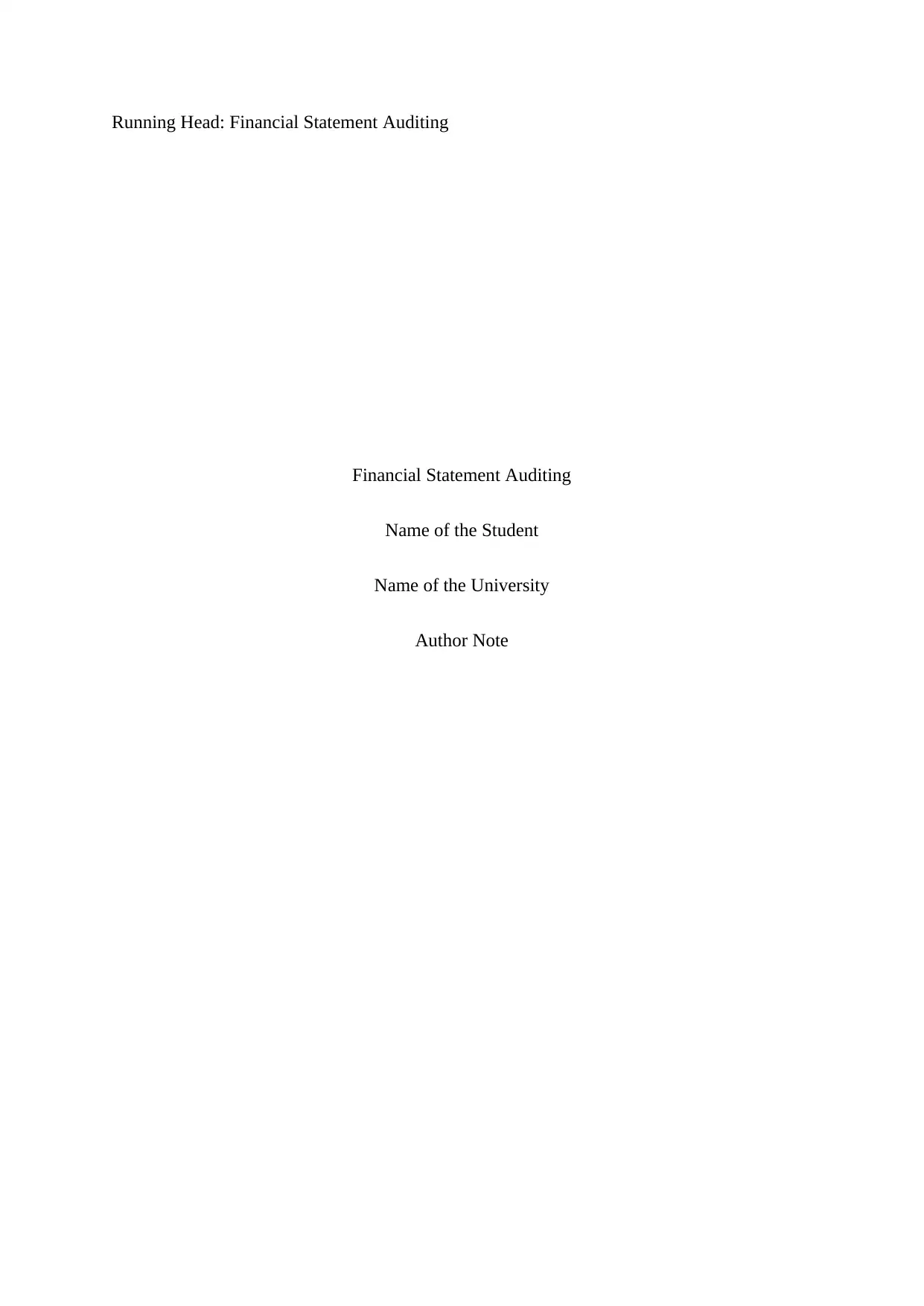
Running Head: Financial Statement Auditing
Financial Statement Auditing
Name of the Student
Name of the University
Author Note
Financial Statement Auditing
Name of the Student
Name of the University
Author Note
Paraphrase This Document
Need a fresh take? Get an instant paraphrase of this document with our AI Paraphraser
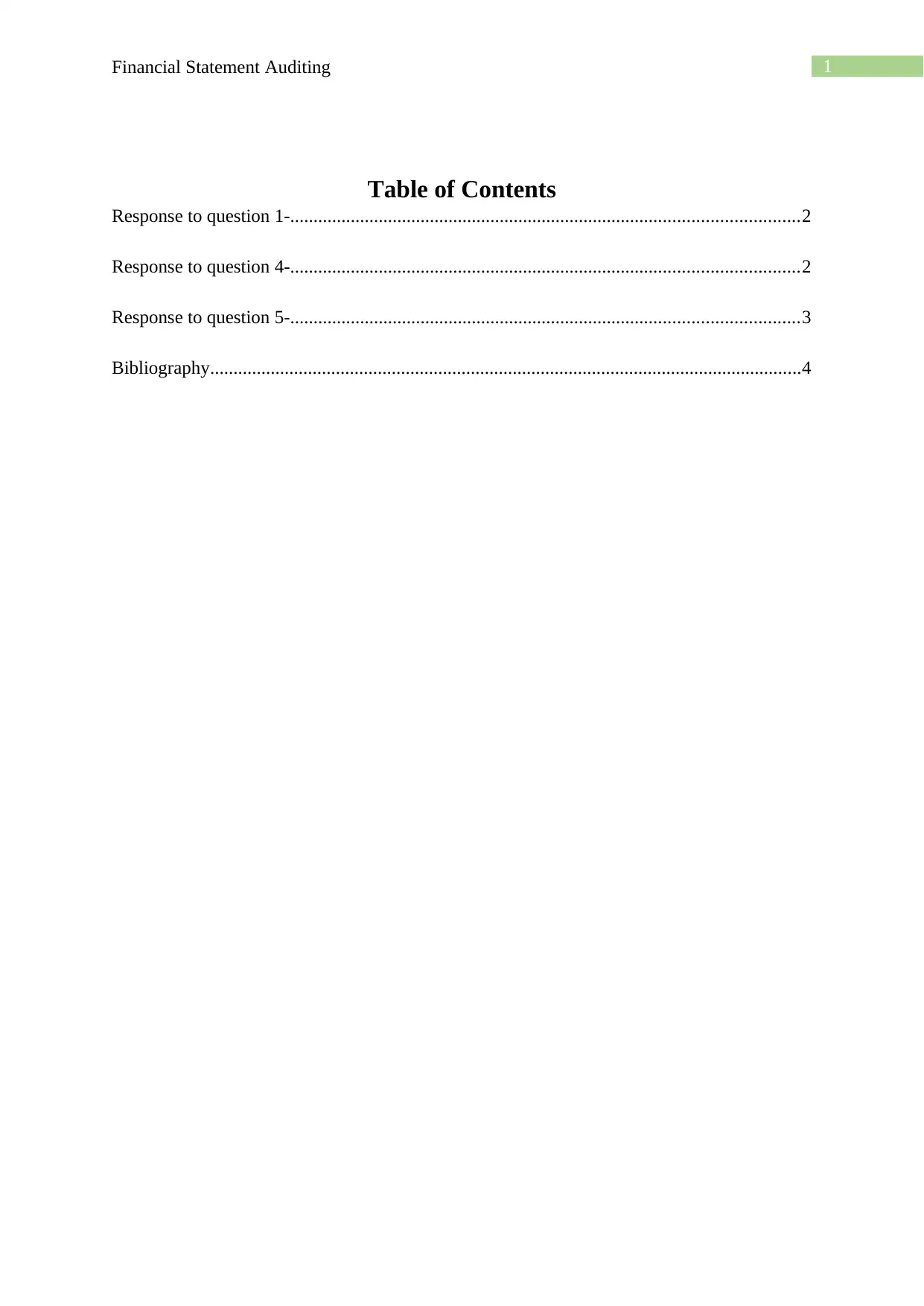
1Financial Statement Auditing
Table of Contents
Response to question 1-.............................................................................................................2
Response to question 4-.............................................................................................................2
Response to question 5-.............................................................................................................3
Bibliography...............................................................................................................................4
Table of Contents
Response to question 1-.............................................................................................................2
Response to question 4-.............................................................................................................2
Response to question 5-.............................................................................................................3
Bibliography...............................................................................................................................4
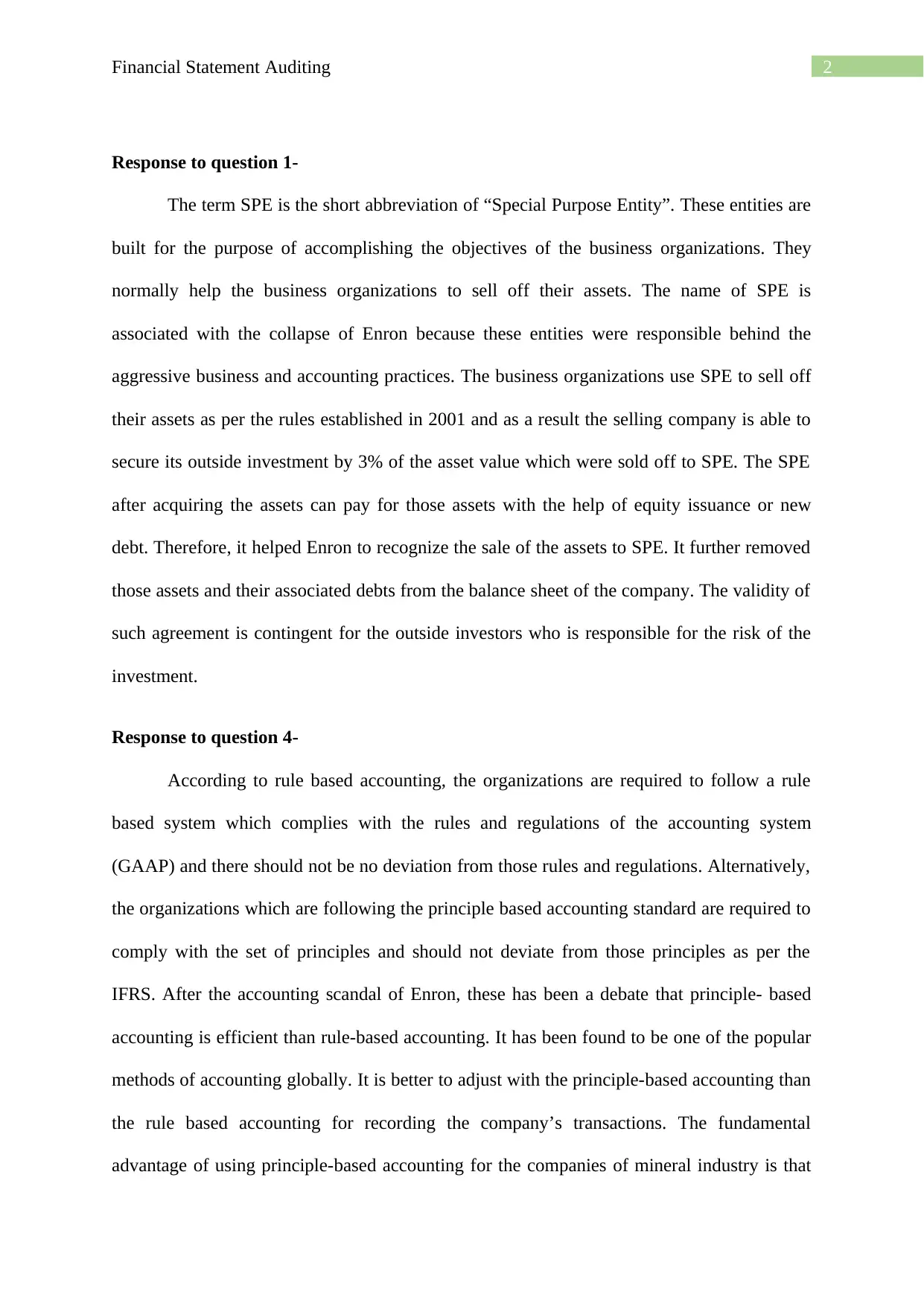
2Financial Statement Auditing
Response to question 1-
The term SPE is the short abbreviation of “Special Purpose Entity”. These entities are
built for the purpose of accomplishing the objectives of the business organizations. They
normally help the business organizations to sell off their assets. The name of SPE is
associated with the collapse of Enron because these entities were responsible behind the
aggressive business and accounting practices. The business organizations use SPE to sell off
their assets as per the rules established in 2001 and as a result the selling company is able to
secure its outside investment by 3% of the asset value which were sold off to SPE. The SPE
after acquiring the assets can pay for those assets with the help of equity issuance or new
debt. Therefore, it helped Enron to recognize the sale of the assets to SPE. It further removed
those assets and their associated debts from the balance sheet of the company. The validity of
such agreement is contingent for the outside investors who is responsible for the risk of the
investment.
Response to question 4-
According to rule based accounting, the organizations are required to follow a rule
based system which complies with the rules and regulations of the accounting system
(GAAP) and there should not be no deviation from those rules and regulations. Alternatively,
the organizations which are following the principle based accounting standard are required to
comply with the set of principles and should not deviate from those principles as per the
IFRS. After the accounting scandal of Enron, these has been a debate that principle- based
accounting is efficient than rule-based accounting. It has been found to be one of the popular
methods of accounting globally. It is better to adjust with the principle-based accounting than
the rule based accounting for recording the company’s transactions. The fundamental
advantage of using principle-based accounting for the companies of mineral industry is that
Response to question 1-
The term SPE is the short abbreviation of “Special Purpose Entity”. These entities are
built for the purpose of accomplishing the objectives of the business organizations. They
normally help the business organizations to sell off their assets. The name of SPE is
associated with the collapse of Enron because these entities were responsible behind the
aggressive business and accounting practices. The business organizations use SPE to sell off
their assets as per the rules established in 2001 and as a result the selling company is able to
secure its outside investment by 3% of the asset value which were sold off to SPE. The SPE
after acquiring the assets can pay for those assets with the help of equity issuance or new
debt. Therefore, it helped Enron to recognize the sale of the assets to SPE. It further removed
those assets and their associated debts from the balance sheet of the company. The validity of
such agreement is contingent for the outside investors who is responsible for the risk of the
investment.
Response to question 4-
According to rule based accounting, the organizations are required to follow a rule
based system which complies with the rules and regulations of the accounting system
(GAAP) and there should not be no deviation from those rules and regulations. Alternatively,
the organizations which are following the principle based accounting standard are required to
comply with the set of principles and should not deviate from those principles as per the
IFRS. After the accounting scandal of Enron, these has been a debate that principle- based
accounting is efficient than rule-based accounting. It has been found to be one of the popular
methods of accounting globally. It is better to adjust with the principle-based accounting than
the rule based accounting for recording the company’s transactions. The fundamental
advantage of using principle-based accounting for the companies of mineral industry is that
⊘ This is a preview!⊘
Do you want full access?
Subscribe today to unlock all pages.

Trusted by 1+ million students worldwide
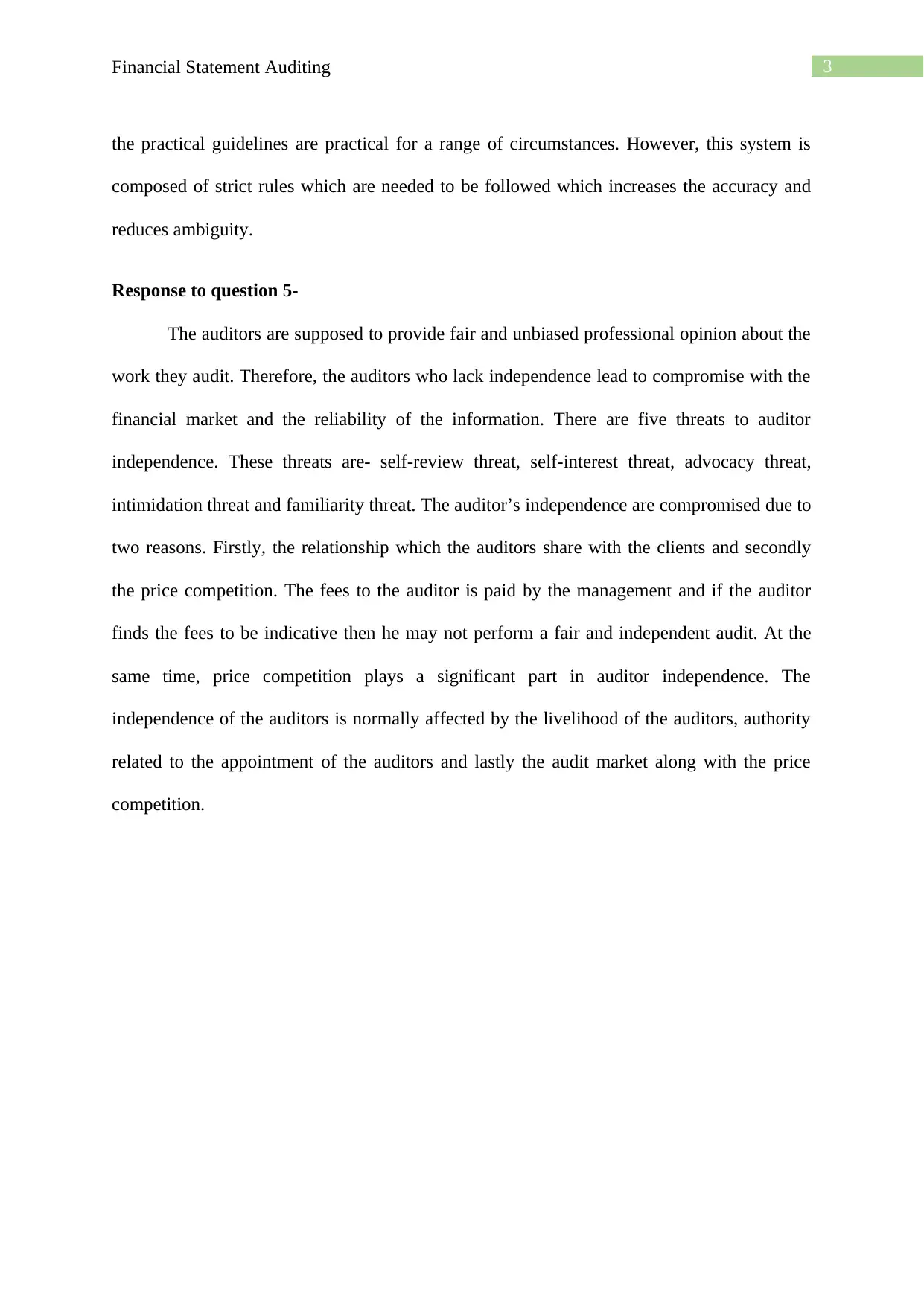
3Financial Statement Auditing
the practical guidelines are practical for a range of circumstances. However, this system is
composed of strict rules which are needed to be followed which increases the accuracy and
reduces ambiguity.
Response to question 5-
The auditors are supposed to provide fair and unbiased professional opinion about the
work they audit. Therefore, the auditors who lack independence lead to compromise with the
financial market and the reliability of the information. There are five threats to auditor
independence. These threats are- self-review threat, self-interest threat, advocacy threat,
intimidation threat and familiarity threat. The auditor’s independence are compromised due to
two reasons. Firstly, the relationship which the auditors share with the clients and secondly
the price competition. The fees to the auditor is paid by the management and if the auditor
finds the fees to be indicative then he may not perform a fair and independent audit. At the
same time, price competition plays a significant part in auditor independence. The
independence of the auditors is normally affected by the livelihood of the auditors, authority
related to the appointment of the auditors and lastly the audit market along with the price
competition.
the practical guidelines are practical for a range of circumstances. However, this system is
composed of strict rules which are needed to be followed which increases the accuracy and
reduces ambiguity.
Response to question 5-
The auditors are supposed to provide fair and unbiased professional opinion about the
work they audit. Therefore, the auditors who lack independence lead to compromise with the
financial market and the reliability of the information. There are five threats to auditor
independence. These threats are- self-review threat, self-interest threat, advocacy threat,
intimidation threat and familiarity threat. The auditor’s independence are compromised due to
two reasons. Firstly, the relationship which the auditors share with the clients and secondly
the price competition. The fees to the auditor is paid by the management and if the auditor
finds the fees to be indicative then he may not perform a fair and independent audit. At the
same time, price competition plays a significant part in auditor independence. The
independence of the auditors is normally affected by the livelihood of the auditors, authority
related to the appointment of the auditors and lastly the audit market along with the price
competition.
Paraphrase This Document
Need a fresh take? Get an instant paraphrase of this document with our AI Paraphraser
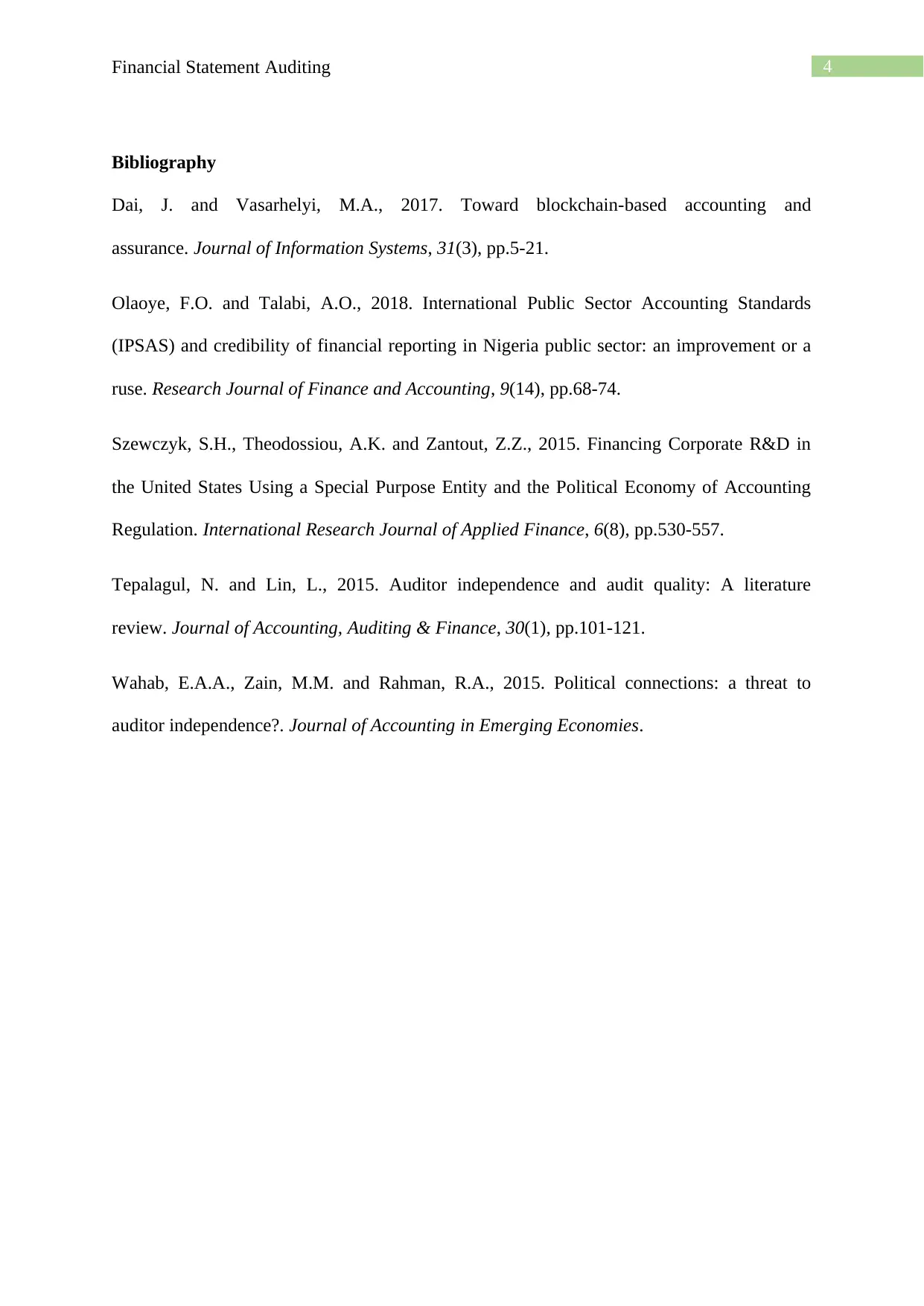
4Financial Statement Auditing
Bibliography
Dai, J. and Vasarhelyi, M.A., 2017. Toward blockchain-based accounting and
assurance. Journal of Information Systems, 31(3), pp.5-21.
Olaoye, F.O. and Talabi, A.O., 2018. International Public Sector Accounting Standards
(IPSAS) and credibility of financial reporting in Nigeria public sector: an improvement or a
ruse. Research Journal of Finance and Accounting, 9(14), pp.68-74.
Szewczyk, S.H., Theodossiou, A.K. and Zantout, Z.Z., 2015. Financing Corporate R&D in
the United States Using a Special Purpose Entity and the Political Economy of Accounting
Regulation. International Research Journal of Applied Finance, 6(8), pp.530-557.
Tepalagul, N. and Lin, L., 2015. Auditor independence and audit quality: A literature
review. Journal of Accounting, Auditing & Finance, 30(1), pp.101-121.
Wahab, E.A.A., Zain, M.M. and Rahman, R.A., 2015. Political connections: a threat to
auditor independence?. Journal of Accounting in Emerging Economies.
Bibliography
Dai, J. and Vasarhelyi, M.A., 2017. Toward blockchain-based accounting and
assurance. Journal of Information Systems, 31(3), pp.5-21.
Olaoye, F.O. and Talabi, A.O., 2018. International Public Sector Accounting Standards
(IPSAS) and credibility of financial reporting in Nigeria public sector: an improvement or a
ruse. Research Journal of Finance and Accounting, 9(14), pp.68-74.
Szewczyk, S.H., Theodossiou, A.K. and Zantout, Z.Z., 2015. Financing Corporate R&D in
the United States Using a Special Purpose Entity and the Political Economy of Accounting
Regulation. International Research Journal of Applied Finance, 6(8), pp.530-557.
Tepalagul, N. and Lin, L., 2015. Auditor independence and audit quality: A literature
review. Journal of Accounting, Auditing & Finance, 30(1), pp.101-121.
Wahab, E.A.A., Zain, M.M. and Rahman, R.A., 2015. Political connections: a threat to
auditor independence?. Journal of Accounting in Emerging Economies.
1 out of 5
Related Documents
Your All-in-One AI-Powered Toolkit for Academic Success.
+13062052269
info@desklib.com
Available 24*7 on WhatsApp / Email
![[object Object]](/_next/static/media/star-bottom.7253800d.svg)
Unlock your academic potential
Copyright © 2020–2026 A2Z Services. All Rights Reserved. Developed and managed by ZUCOL.




